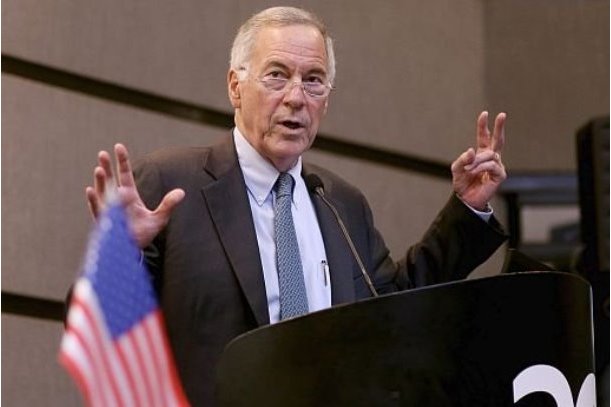‘Nigeria’s new forex policy is dead on arrival without strong rule of law and disciple’

Feature Highlight
The weakness of the naira won't end anytime soon unless there is a currency reform by way of installing a currency board.
Professor of Applied Economics at The Johns Hopkins University, Steve H. Hanke, has said the flexible interbank foreign exchange market recently introduced by Central Bank of Nigeria (CBN) will not produce the desired result. According to him, this exchange-rate regime requires very strong rule of law and discipline, which he believes Nigerian monetary officials do not have.
In an exclusive interview with Financial Nigeria, Prof. Hanke says, "Nigeria has jumped from the frying pan into the fire. A managed floating rate will never work in Nigeria."
After several months of defending its policy not to devalue the naira, the CBN ended its naira peg to the U.S. dollar by reviving the flexible interbank foreign exchange market on Monday.
The apex bank effectively allowed the naira to float – or what analysts have called ‘managed float’ – through a single market structure in the inter-bank FX market.
The naira fell by 42 percent from N199/USD to N281.85/USD and N284.83/USD on Monday and Tuesday, respectively, as the CBN tried to clear a backlog of forex orders. However, the naira appreciated to N282.80/USD on Wednesday and also rose to N281.67/USD on Thursday at the interbank forex market.
The U.S. economist recommends that, to impose discipline in the exchange regime, Nigeria should impose a currency board system.
A currency board is a fixed exchange rate regime whereby the domestic currency base is 100 percent backed by foreign reserves. In other words, there is full convertibility of a local currency into a reserve one at a fixed exchange rate. The system requires long-term commitment and discipline. Some of the advantages of using a currency board include low inflation and lower interest rates. The Economist argues that a currency board offers the prospect of a stable exchange rate, which can promote both trade and investment.
The Hong Kong dollar (HKD) is linked to the USD via a currency board. The HKD has been officially fixed at 7.8 HKD per one U.S. dollar since the currency board was introduced in 1983.
Hanke, a Senior Fellow at the Cato Institute in Washington, D.C., said he set up currency board system in Estonia (1992), Lithuania (1994), Bulgaria (1997), and Bosnia-Herzegovina (1998). In his opinion, those currency boards worked to impose discipline and stability.
Hanke says the weakness of the naira will not end anytime soon unless there is a currency reform by way of installing a currency board. He says this is also the solution for inflation.
According to him, there is a large discrepancy between Nigeria's official inflation figure of 15.6 percent for May 2015 and his calculations using the lie coefficient.
Prof. Hanke and his colleagues developed lie coefficients during the Soviet era, to approximate the real inflation because "Soviet statistics were simply the product of the Soviets’ imagination," according to the U.S. economist. The formula is: (official data) X (lie coefficient) = real estimate.
By applying Nigeria's lie coefficient, which he says is currently 4.1, to the official data, Hanke says the implied inflation rate for Nigeria in May was 63.9 percent. The coefficient is derived by using changes in the black market exchange rate data and applying the Purchasing Power Parity Theory.
Prof. Hanke says there are many reasons Nigeria’s economic data is roundly negative, including rising inflation. He says one of the reasons is low oil prices. Nevertheless, Hanke maintains that the exchange rate system is still a major problem.
“The killer is the currency regimes – both the old and the new one. There is no stability, and while stability might not be everything, everything is nothing without stability,” says Hanke, who also directs the Troubled Currencies Project, joint initiative of the Cato Institute and Johns Hopkins University.
Prof. Hanke has participated and helped to tackle hyperinflation in 21 countries including Argentina, Azerbaijan, Belarus, Bulgaria, Estonia, Georgia, Lithuania and Russia.
Other Features
-
Are we in a financial bubble?
There are at least four ways to determine when a bubble is building in financial markets.
-
Powering financial inclusion across Africa with real-time digital ...
Nigeria is a leader in real-time digital payments, not only in Africa but globally also.
-
Analysis of NERC draft Net Billing Regulations 2025
The draft regulation represents a significant step towards integrating renewable energy at the distribution level of ...
-
The need for safeguards in using chatbots in education and healthcare
Without deliberate efforts the generative AI race could destabilise the very sectors it seeks to transform.
-
Foundation calls for urgent actions to tackle fake drugs and alcohol
Olajide Olutuyi, Executive Director, Samuel Olutuyi Foundation, warns: “If left unchecked, the ‘death ...
-
Got excess airtime? Discover the Top 5 Best Platforms to sell ...
Prestmit is one of the leading airtime-to-cash platforms in Nigeria, known for its speed and reliability.
-
-
Trump is losing his geoeconomic war
The Trump administration has reached for the most obvious and widely discussed lever: the dollar.
-
Lessons from Lesotho for low-income countries
For years, global development practitioners have been trapped in a false choice of aid versus trade. Lesotho tried ...
Most Popular News
- NDIC pledges support towards financial system stability
- Artificial intelligence can help to reduce youth unemployment in Africa – ...
- Lagride launches minibus service to disrupt Korope in Lagos
- Foundation calls for urgent actions to tackle fake drugs and alcohol
- We are better positioned to prosecute suspects in bank failures - NDIC Boss
- Ventures Platform secures $64 million for seed funding















